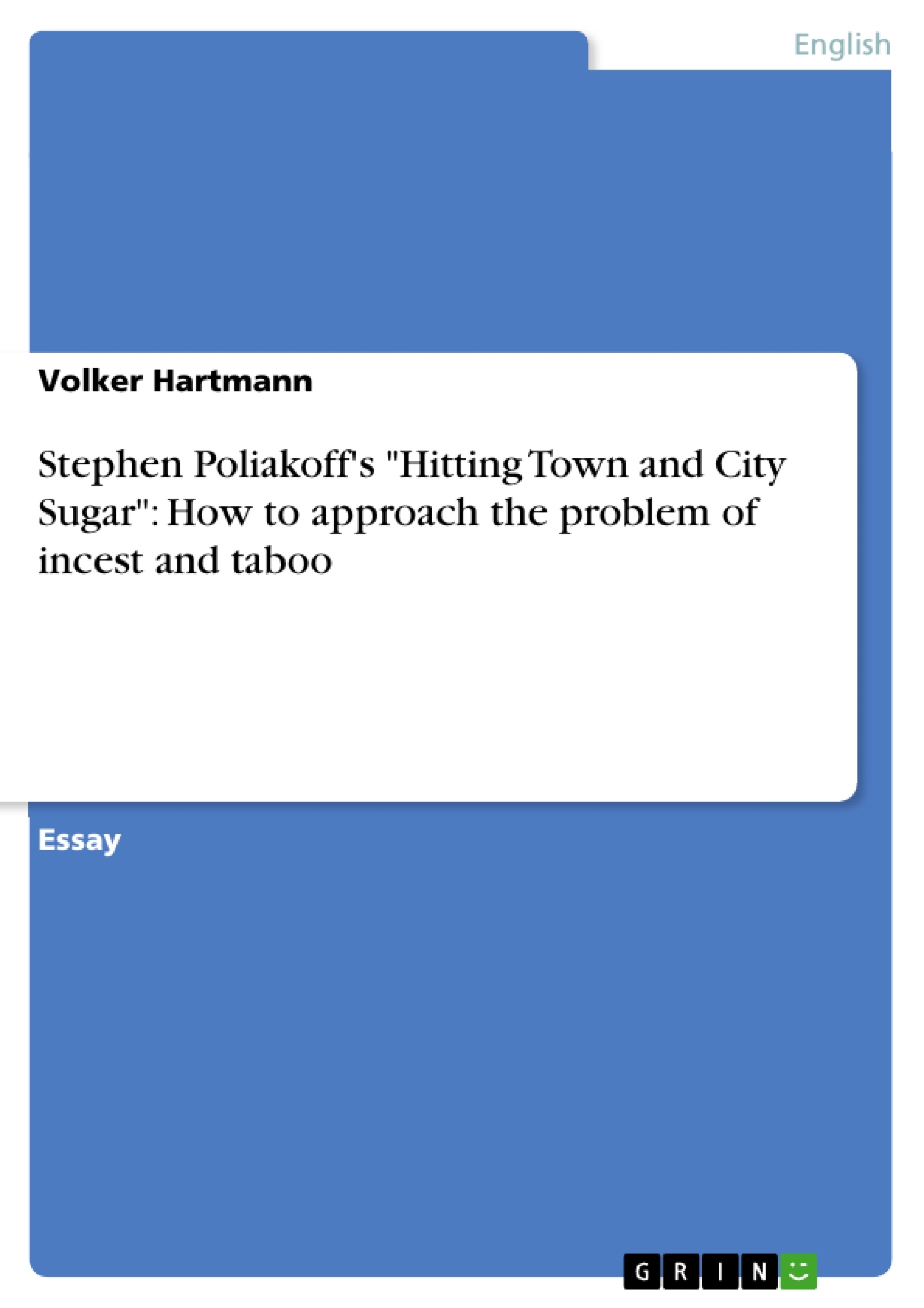Course Subject: The Purpose of Art
Essay topic (situation): Imagine to be involved in the performance or production of the play. How would you approach the problem of incest and taboo and of representing incest on stage?
The essay mainly analyzes the way in which difficult topics like incest, or taboo topics in general, are addressed in literature as well as in performances on stage.
Inhaltsverzeichnis (Table of Contents)
- Taboo Topics and the Purpose of Art
- Circuito Cerrado: Breaking the Silence
- Incest in Theatre: A Historical Perspective
- The Importance of Enlightenment and Free Speech
- Taboo Topics in Different Societies
- The Power of Theatre in Addressing Taboos
- Presenting Incest on Stage: A Delicate Balance
- Techniques for Presenting Taboo Topics
- Audience Engagement and Ethical Decision-Making
- Ralph and Clare: A Case Study in Incest on Stage
Zielsetzung und Themenschwerpunkte (Objectives and Key Themes)
This essay examines the challenges and opportunities of representing incest on stage. The author explores how theatre can be used to address taboo topics and foster public discourse, while also considering the ethical and practical considerations involved in staging such sensitive material.- The use of theatre to address taboo topics.
- The ethical and practical considerations of representing incest on stage.
- The role of audience engagement and ethical decision-making in theatrical presentations.
- The historical evolution of incest as a taboo topic in theatre.
- The importance of enlightenment and free speech in addressing sensitive issues.
Zusammenfassung der Kapitel (Chapter Summaries)
- The essay begins by introducing the concept of taboo topics and their significance in society. It highlights the importance of addressing these topics, especially through art forms like theatre, to promote understanding and break down societal barriers.
- The author then discusses the case of Silvia Molina's play "Circuito Cerrado," which explores the taboo topic of family incest in Mexico. The essay emphasizes how theatre allows for the exploration of sensitive subjects in a way that written forms cannot.
- The chapter then examines the historical representation of incest in theatre, using Thomas Middleton's "Women Beware Women" as an example. The essay argues that the portrayal of incest in this era differed significantly from modern representations due to changing societal views.
- The essay delves into the importance of addressing the psychological and legal consequences of incestuous relationships, highlighting the need for enlightenment on these complex issues.
- The chapter explores the cultural differences surrounding taboo topics, emphasizing the need for sensitivity when addressing such issues in diverse societies.
- The essay focuses on the power of theatre in sparking discussions about taboo topics and encouraging audience engagement. It cites examples of plays that have successfully engaged audiences in post-show discussions.
- The author addresses the challenges of presenting incest on stage, highlighting the need to find a balance between shocking the audience and initiating meaningful dialogue.
- The essay explores various performance techniques that can be used to present taboo topics in a less threatening way, such as "out of association character interaction."
- The chapter discusses the importance of audience engagement and active participation in the ethical decision-making process during theatrical performances.
- The essay concludes by analyzing the portrayal of incest in a hypothetical play featuring characters named Ralph and Clare. It emphasizes the importance of context and the need to introduce the taboo topic gradually before confronting the audience with the actual act of incest.
Schlüsselwörter (Keywords)
The primary focus of this essay lies in the intersection of taboo topics, theatre, and the representation of incest on stage. Key themes explored include the power of art to address sensitive issues, the importance of audience engagement, the ethical considerations of staging such material, and the potential for theatre to facilitate meaningful discussions.Frequently Asked Questions
What is the purpose of art in addressing taboo topics?
Art, particularly theater, serves to break societal silence, foster public discourse, and promote understanding of complex issues like incest that are often avoided.
How can incest be represented on stage ethically?
It requires a delicate balance between initiating meaningful dialogue and shocking the audience, often using gradual introduction and specific performance techniques.
What are "out of association character interaction" techniques?
These are performance methods used to present sensitive or threatening topics in a way that allows the audience to engage without feeling immediately overwhelmed.
Has the representation of incest in theater changed over time?
Yes, historical plays like Middleton's "Women Beware Women" portrayed incest differently than modern works due to evolving societal views and legal contexts.
Why is audience engagement important in plays about taboos?
Active participation and post-show discussions help the audience process the material and participate in the ethical decision-making reflected in the performance.
- Quote paper
- Volker Hartmann (Author), 2011, Stephen Poliakoff's "Hitting Town and City Sugar": How to approach the problem of incest and taboo, Munich, GRIN Verlag, https://www.grin.com/document/208193



